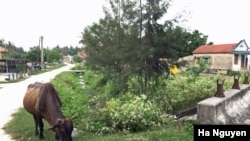It is fairly common that a person accused of a crime has the right to an attorney, but what about the victim of the alleged crime? This question was raised in Vietnam, which has now answered it with a regulation that guarantees victims the right to legal representation. This could also have a direct effect on the problem of human trafficking in Vietnam.
The regulation, Circular 46, should be particularly beneficial for victims of trafficking and abuse, according to the Blue Dragon Children's Foundation, which works on those issues and worked with the government on the circular. Discussions around the regulation have been ongoing, but they take on heightened significance now that the deaths of 39 Vietnamese in a refrigerated truck in Britain have put a spotlight on human trafficking.
The significance of the legal change is to decrease any confusion over whether victims can have their attorneys present with them.
“While the law itself still needs some work, this circular ensures that victims of trafficking, abuse, and every other crime have this basic legal protection,” Michael Brosowski, the founder and chief executive officer of Blue Dragon, said in an emailed note. “Even more, the introduction of the circular ensures that every official working in the sector knows the role of legal counsel for victims of crimes.”
Before the circular took effect in October, the issue was that police could be in the middle of investigating an alleged crime, but they would not be sure of what legal status or legal role a victim might have in the process. The circular makes clear that victims and their attorneys can be involved, so that police do not have to worry about whether they are following proper procedure by involving them. The circular gives them a clear document they can point to throughout the investigation.
Issued by the Ministry of Public Security, the regulation lays out the official procedures victims and their attorneys should take, including registering with authorities, filling out required documentation, and presenting identification. This should give them a clear legal status in the investigation.
Founded in 2003, Blue Dragon is based in Hanoi and focuses particularly on street children and other young people who may be vulnerable to abuse, including sex trafficking.
Their work is not directly related to the news in October that British police found 39 people in a container truck, who they believe suffocated to death after being trafficked from Vietnam. However those deaths have increased the level of public awareness about human trafficking in general.
Ever since the victims were discovered, Vietnamese and British police have worked together on an investigation, including the arrest of several suspects in both countries. Vietnam has also announced arrests in other investigations of alleged human trafficking not directly related to the British case. Potential victims in any of those cases, including those soon returning to the Southeast Asian nation, would have new rights to an attorney under Circular 46.
Among Asian migrants, Vietnamese pay the highest costs to brokers to take them overseas, and the number of migrants is rising, according to the International Labor Organization in Vietnam. It recommends that governments collaborate to ensure safe channels for migration, so that people don’t have to resort to dangerous brokers. Migrants are still going through irregular channels because globalization has created more jobs in more places. But while globalization has fostered the flow of companies and capital across borders, it has not done so for workers, pushing them toward trafficking, advocates for victims say.








